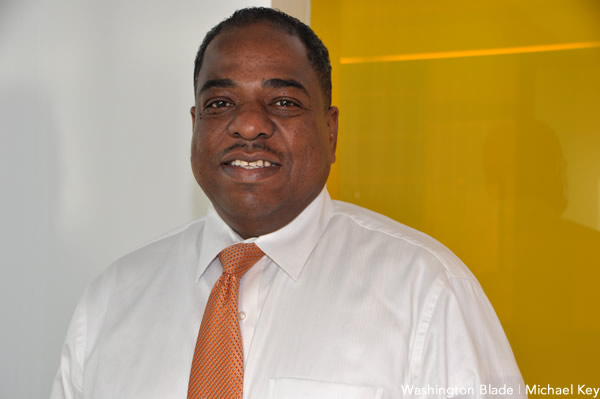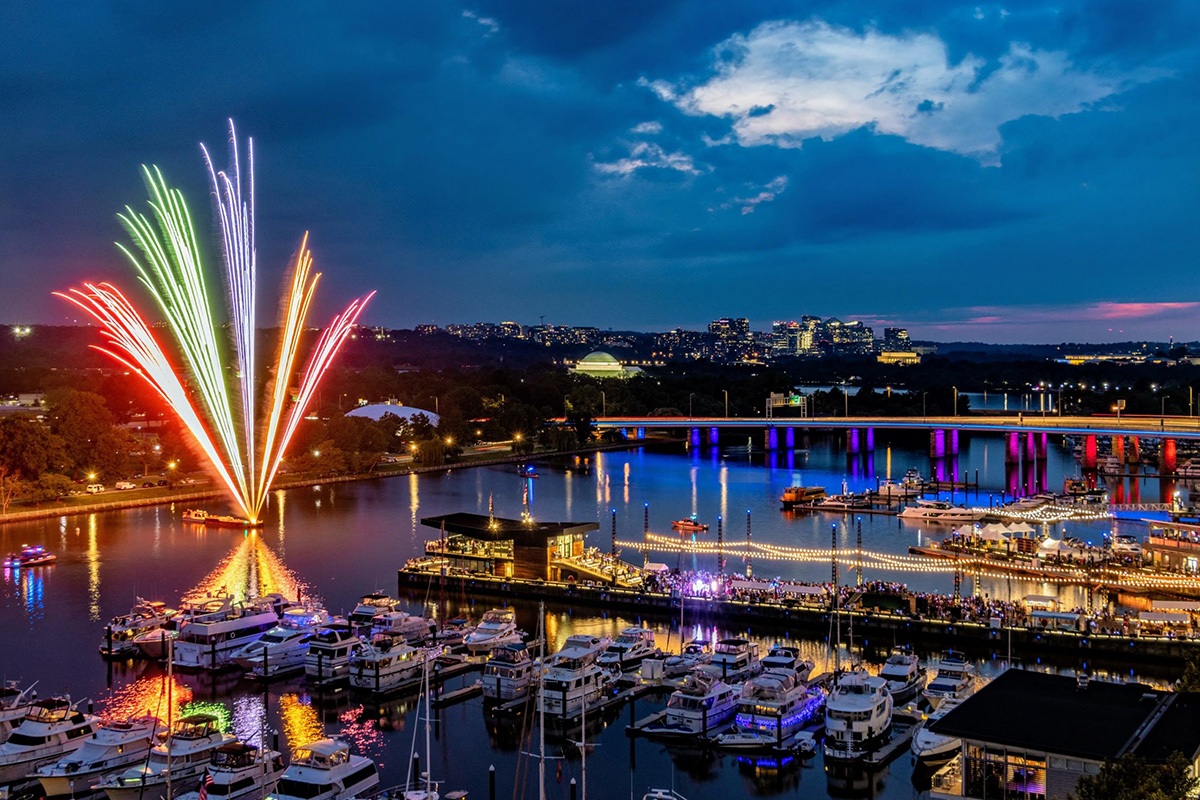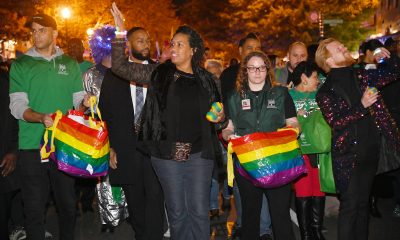Local
D.C. prepares for primary
Election outcome not likely to change Council support on LGBT issues


Political observers say Democratic opponents with the backing of LGBT activists have a shot at unseating Council member Vincent Orange in next week’s primary. Orange once opposed marriage equality but later changed his mind. (Washington Blade photo by Michael Key)
The District’s influential LGBT vote was expected to be divided on April 3 in the hotly contested race for an at-large D.C. Council seat held by Democratic incumbent Vincent Orange.
Orange and four of his Council colleagues — Jack Evans (D-Ward 2), Muriel Bowser (D-Ward 4), Yvette Alexander (D-Ward 7) and Marion Barry (D-Ward 8) — are running for re-election in the Democratic Party primary. Evans, a longtime supporter of LGBT rights, is running unopposed.
Similar to nearly all past elections, the winner in the primary is expected to win the general election in November in a city where registered Democrats far outnumber Republicans.
But unlike most D.C. primaries in recent years, where almost all incumbents win, political observers say Democratic opponents with the backing of LGBT activists have a shot at unseating Orange and Alexander.
And the president of the gay GOP group Log Cabin Republicans of D.C., Robert Turner, says gay Republicans are joining their moderate to progressive fellow party activists to wage a spirited challenge for at least three Council seats in the November election.
Based on the candidates running, most LGBT activist leaders say they don’t expect the election outcome in the April primary or November general election to change the D.C. Council’s overall longstanding support for LGBT equality.
“I do not see any changes that will impact the LGBT community,” said gay Democratic activist Peter Rosenstein. “We are a strong community with the support of the majority of the Council today and that will continue,” he said.
Alexander and Barry were the only two Council members that voted against the city’s same-sex marriage law when it passed in the Council by a vote of 11-2 in 2009. Both have been supportive on most other LGBT issues in the past.
However, the Gay & Lesbian Activists Alliance this year assigned Alexander and Barry a -3.5 rating on LGBT-related issues in a rating system with -10 as the lowest possible score and +10 the highest. (A full listing of GLAA’s ratings of all D.C. Council candidates and the candidates’ responses to GLAA’s questionnaire on LGBT-related issues can be viewed at glaa.org.)
The Gertrude Stein Democratic Club, the city’s largest LGBT political group, has endorsed both Alexander and Barry in past elections. This year the club endorsed Ward 7 challenger Tom Brown over Alexander. The club didn’t make an endorsement in the Ward 8 race after none of five Democratic candidates running were able to obtain a 60 percent vote from club members to secure an endorsement.
The club also endorsed Bowser in the Ward 4 race, who’s favored to emerge as the winner over five Democratic challengers. Bowser, who voted for the same-sex marriage bill, received a +6.5 rating from GLAA.
Orange wasn’t on the Council at the time of the same-sex marriage vote. He came out against same-sex marriage when he ran unsuccessfully for mayor in 2006 but said he changed his mind on the issue a short time later. He says he now strongly supports the city’s marriage equality law and points to his past support on a wide range of other LGBT-related issues during his tenure as a Ward 5 Council member from 1999 to 2007.
GLAA, which assigned Orange a rating of +0.5, says Orange lost points for backing a number of initiatives opposed by GLAA, including a bill to make permanent certain locations in the city designated as “prostitution free zones.” Many of the city’s gay activists have joined transgender rights leaders and civil liberties advocates in calling for repeal of the law that created temporary prostitution free zones, saying it has been used to target and “profile” transgender women for police harassment on grounds that they appear to be engaging in prostitution by merely standing in certain parts of the city designated as prostitution free zones.
Orange said he no longer supports the bill to make the zones permanent. The bill calling for making them permanent was introduced by Alexander.
He is being challenged by former D.C. school board member Sekou Biddle, who was appointed to the at-large Council seat for less than a year in 2011, before losing it to Orange in an April 2011 special election. The seat became vacant in January 2011 after Council member Kwame Brown, who held the seat, won election to the post of Council chairman. Biddle received a GLAA rating of +5.5.
Also competing for the seat in the April 3 Democratic primary are Peter Shapiro, a former Prince George’s County Council member who recently moved to D.C., who also received a +5.5 GLAA rating, and E. Gail Anderson Holness, a Ward 1 Democratic activist and pastor of D.C.’s Christ Our Redeemer AME Church, who received a -1.5 GLAA rating.
Biddle and Shapiro have expressed strong support on LGBT issues. Both have lined up support in the LGBT community, with the largest number of prominent LGBT activists backing Biddle. Holness, who has called for a voter referendum on the city’s same-sex marriage law, failed to obtain a single vote at a Stein Club endorsement meeting earlier this month.
Biddle finished ahead of Orange in the Stein endorsement vote but fell five points short of the 60 percent needed for an endorsement. Gay supporters of Orange and Shapiro said support for their respective candidates prevented Biddle from winning the club’s endorsement, saying the development indicates Biddle’s support in the LGBT community may be declining.
They note that the Stein Club endorsed Biddle over Orange in the April 2011 special election, in which Biddle finished in third place behind Republican Patrick Mara and Orange, who won the election.
Biddle supporter John Fanning, a longtime gay Democratic activist, said polling data shows that Biddle has emerged as Orange’s strongest challenger and has a shot at beating Orange if the opposition vote isn’t evenly divided between Biddle and Shapiro.
Biddle has been endorsed by gay D.C. Council member David Catania (I-At-Large), and former rival Mara, a pro-LGBT school board member from Ward 1 who campaigned for the city’s same-sex marriage bill when it was pending before the Council.
Stein Club President Lateefah Williams said she believes challenger Tom Brown has a reasonable chance of beating Alexander in the Ward 7 primary. But similar to the at-large race, Williams and others seeking to replace Alexander say Alexander is likely to win if what they believe is a majority of the electorate opposing Alexander is divided among several candidates. Brown received a GLAA rating of +3.5.
Five candidates in addition to Brown are running against Alexander in the primary, including Kevin Chavous Jr., son of former Ward 7 Council member Kevin Chavous Sr., who also received a +3.5 GLAA rating.
Also running unopposed in the primary is D.C. Congressional Delegate Eleanor Holmes Norton, who is considered to be among the strongest supporters of LGBT rights in the U.S. Congress; and shadow U.S. House candidate Nate Bennett-Fleming. Both received endorsements from the Stein Club. GLAA doesn’t issue ratings for federal offices.
The Stein Club didn’t make an endorsement in the race for the city’s shadow Senate seat, in which incumbent Michael D. Brown is being challenged in the Democratic primary by Pete Ross. Both have expressed support for LGBT rights.
Republican Mary Brooks Beatty is running unopposed in the April 3 D.C. Republican primary for the at-large Council seat. In the Statehood-Green Party primary, Ann Wilcox and G. Lee Aikin are also competing for the at-large Council seat. Brooks received a “0” GLAA rating for not returning the group’s questionnaire and not having a known record on LGBT issues. Wilcox received a +0.5 rating. GLAA said she, too, did not return the questionnaire but received a half point for her record of support as an attorney for the gay direct action group Get Equal.
In the Ward 7 Council race, longtime community and anti-crime activist Ron Moten, who has helped the former LGBT gang Check It convert into a youth organization promoting a fashion clothing line, is running for the Republican nomination. He is being challenged by GOP candidate Don Folden Sr. The Log Cabin Republicans of D.C. has endorsed Moten and Brooks. Moten received a +1.5 GLAA rating.
District of Columbia
LGBTQ budget advocates fight for D.C. resources in a tough fiscal year
‘Trying to preserve life-saving services’ amid $1 billion cut

The months and days leading up to June are especially busy for LGBTQ Washingtonians. For one group, the DC LGBT Budget Coalition, which works year-round to ensure LGBTQ residents are represented and financially supported by the D.C. government, this time of year is their Super Bowl. Beginning in April, the D.C. Council and Mayor’s Office hold budget hearings for the next fiscal year.
With D.C.’s budget now under review, the Washington Blade spoke with Heidi Ellis, coordinator of the DC LGBT Budget Coalition, about the group’s top priorities and their push to ensure continued support for queer communities.
“The LGBTQ Budget Coalition was founded in 2020 at the height of the pandemic, as a way for the community to work together to advocate for key funding and policy changes,” Ellis said. “We recognized we were stronger together. A lot of groups are often pitted against each other for resources and dollars. This coalition was founded out of a need for unity. Since then, we’ve successfully advocated for more than $20 million in dedicated LGBTQ investments.”
In addition to coordinating the coalition, Ellis is the founder and CEO of HME Consulting & Advocacy, a firm that helps build coalitions and advance policy initiatives that address intersectional issues in the LGBTQ community. One of its most powerful tools, she explained, is direct outreach through community surveys.
“We actually do community surveys to see what people need and what’s top of mind,” Ellis said. “Of course, we also pay attention to the broader political landscape — like the current threats to HIV funding. That helps us prioritize.”
Because the coalition is comprised of more than 20 organizations across various sectors —healthcare, housing, community organizing — Ellis said its diversity enables it to connect grassroots needs to potential policy solutions.
“Our coalition includes service providers, community groups, health and housing advocates-folks who are deeply plugged into what’s happening on the ground,” she said. “They help determine our direction. We know we don’t represent every queer person in D.C., but our coalition reflects a wide range of identities and experiences.”
The insights gathered through those surveys ultimately inform the coalition’s annual budget proposal, which is submitted to the Council and mayor.
“That’s how we got to our FY26 priorities,” she said. “This year, more than ever, we’re fighting to protect what we’ve already secured — funding and policies we’ve had to fight for in the past. We know there’s concern around this budget.”
One of the challenges this year is that the D.C. government’s operating budget and some of its legislation must be approved by Congress. With a projected decline in tax revenue and a Republican-controlled Congress that has historically opposed LGBTQ funding, the Coalition has had to think strategically.
“Even before the situation on the Hill, the CFO projected lower revenue,” Ellis said. “That meant cuts to social programs were already coming. And now, with the $1 billion slashed from D.C.’s budget due to the continuing resolution, we’re not only fighting for D.C.’s budget and autonomy, but also trying to preserve life-saving services. Our message is simple: Don’t forget about queer people.”
This year’s proposal doesn’t include specific dollar figures. Instead, the Coalition outlines five funding priority areas: Healthcare, Employment & Economic Equity, Housing, Safety & Community Support, and Civil Rights.
Why no exact amounts? Ellis said it’s because not all solutions are financial.
“Some of our asks don’t require new funding. Others build on existing programs-we’re asking whether the current use of funds is the most effective. We’re also proposing policy changes that wouldn’t cost extra but could make a real difference. It’s about using what we have better,” she said.
When drafting the proposal, the Coalition tries to prioritize those with the most pressing and intersecting needs.
“Our perspective is: If we advocate for the most vulnerable, others benefit too,” Ellis said. “Take LGBTQ seniors. Some may have done well in life but now face housing insecurity or struggle to access affordable healthcare. Many in our coalition are elders who fought on the frontlines during the AIDS epidemic. They bring critical historical context and remind us that Black and brown communities bore the brunt of that crisis.”
“I love our coalition because it keeps us accountable to the moment,” she added. “If we center those most marginalized, we can make an impact that lifts everyone.”
In addition to healthcare and housing, safety remains a top concern. The Coalition has fought to maintain funding for the Violence Prevention and Response Team (VPART), a city-supported group that includes MPD, community-based organizations, and the Mayor’s Office of LGBTQ Affairs. VPART responds to crimes affecting the LGBTQ community and connects victims to legal, healthcare, and housing services.
“We’ve pushed to make VPART more proactive, not just reactive,” Ellis said. “The funding we’ve secured has helped survivors get the support they need. Cutting that funding now would undo progress we’re just beginning to see.”
At the end of the day, Ellis emphasized that this process is about far more than spreadsheets.
“A budget is a moral document,” she said. “If we’re not represented, you’re telling us our lives don’t matter at a time when we need protection the most. When people can’t get food, medicine, housing — that has a devastating impact. These are vital services.”
The DC LGBT Budget Coalition is urging residents to support a letter-writing campaign to D.C. Council members and the mayor. You can send a letter here: https://actionnetwork.org/letters/fully-fund-dcs-lgbtq-communities
Read the full FY26 budget proposal here: https://drive.google.com/file/d/1bTrENnc4ZazJTO6LPrQ3lZkF02QNIIf1/view
Arts & Entertainment
Washington Blade’s Pride on the Pier returns bigger than ever with two-day WorldPride celebration

The Washington Blade’s Pride on the Pier will be extended to a two-day celebration in honor of WorldPride coming to D.C. this year. Taking place on Friday, June 6 and Saturday, June 7 at The Wharf, this year’s event promises more entertainment, more community, and more pride than ever before — all set against the stunning waterfront backdrop of our nation’s capital.
With the addition of Friday, the party kicks off at 3 p.m., with the inaugural WorldPride Boat Parade at 7 p.m. As an Official WorldPride Partner event, the boat parade will feature 30 decorated boats parading along the Washington Channel. For information on signing up for the boat parade contact Stephen Rutgers at [email protected].
Saturday’s signature Pier Party kicks off at 12 p.m., featuring a drag show, DJ’s, streaming of the WorldPride Parade, and the iconic Fireworks Show Presented by the Leonard-Litz Foundation — one of D.C. Pride’s most anticipated spectacles.
“We’re expanding Washington Blade Pride on the Pier to reflect the excitement and momentum building for WorldPride in D.C.,” said Blade publisher Lynne Brown. “It’s a celebration of our community’s progress and a powerful reminder of the joy and visibility Pride brings to the heart of our city.”
Now in its seventh year, Washington Blade Pride on the Pier extends the city’s annual celebration of LGBTQ visibility to the bustling Wharf waterfront with an exciting array of activities and entertainment for all ages. The District Pier will offer DJs, dancing, drag, and other entertainment. Alcoholic beverages will be available for purchase for those 21 and older.
Pride on the Pier is free and open to the public, with VIP tickets available for exclusive pier access, hosted bars, and private viewing areas for the boat parade and the fireworks show. To purchase VIP tickets visit www.prideonthepierdc.com/vip.
Friday VIP: 5-9 p.m., enjoy an air-conditioned lounge, private bathroom, cash bar and complimentary drink.
Saturday VIP Session #1: 2-5 p.m., enjoy an air-conditioned lounge, private bathroom, catered food, and an open bar.
Saturday VIP Session #2: 6-9 p.m., enjoy the air-conditioned lounge, private bathroom, catered snacks and dinner, and open bar with a front-row view of the fireworks.
Event Details:
📍 Location: District Pier at The Wharf (101 District Sq., S.W., Washington, D.C.)
📅 Dates: Friday, June 6 & Saturday, June 7, 2025
🛥️Boat Parade: 7 p.m. (June 6). 🎆 Fireworks Show: 9 p.m. (June 7)
🎟️ VIP Tickets: www.PrideOnThePierDC.com/VIP
Event sponsors include Absolut, Capital Pride, DC Fray, Infinate Legacy, Heineken, Leonard-Litz Foundation, Mayor’s Office of LGBTQ Affairs, Relish Catering, Washingtonian, and The Wharf. More information regarding activities will be released at www.PrideOnThePierDC.com
Maryland
Md. schools plan to comply with federal DEI demands
Superintendents opt for cooperation over confrontation

By LIZ BOWIE | Deciding not to pick a fight with the Trump administration, Maryland school leaders plan to sign a letter to the U.S. Department of Education that says their school districts are complying with all civil rights laws.
The two-paragraph letter could deflect a confrontation over whether the state’s public schools run diversity, equity, and inclusion programs that the Trump administration has called illegal. The Baltimore Banner reviewed the letter, which was shared by a school administrator who declined to be identified because the letter has not yet been sent.
Maryland school leaders are taking a more conciliatory approach than those in some other states. Education leaders in Minnesota, New York, Colorado, Oregon, Vermont, and Wisconsin said they will not comply with the federal education department’s order, the demands of which, they say, are based on a warped interpretation of civil rights law.
The rest of this article can be found on the Baltimore Banner’s website.
-

 Opinions5 days ago
Opinions5 days agoIt’s time for new leadership on the Maryland LGBTQIA+ Commission
-

 The White House5 days ago
The White House5 days agoWhite House does not ‘respond’ to reporters’ requests with pronouns included
-

 Arts & Entertainment5 days ago
Arts & Entertainment5 days ago‘Gay is Good’ Pride Pils Can Celebrates Frank Kameny’s 100th Birthday for WorldPride in D.C.
-

 Sponsored5 days ago
Sponsored5 days agoTHC Drinks: What You Should Know About Cannabis Beverages












